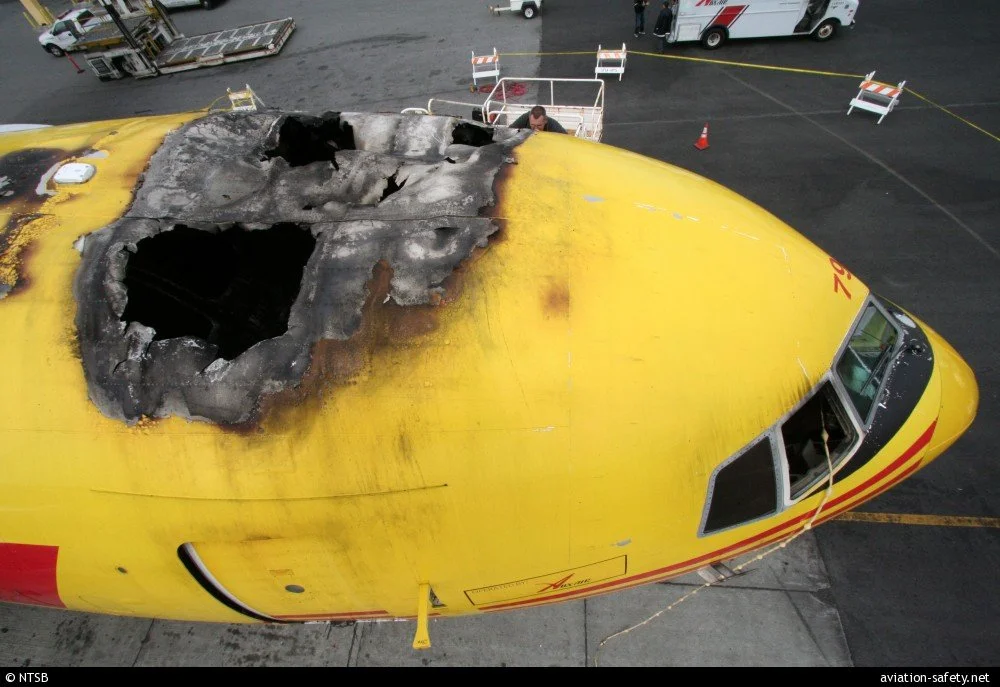FIRE!
Photo: © NTSB
Affiliate Disclosure
Some of the links on this blog are affiliate links. This means that if you click on a link and make a purchase, I may earn a commission at no additional cost to you. I only recommend products and services I genuinely believe in. Thank you for your support!
I flew N799AX just a couple days prior to this accident.
Ironically, my next assignment was a simulator training session at our company training center in Wilmington, Ohio. The scenario we were given was a departure from San Francisco to Wilmington with a deferred right engine generator.
Procedure required us to use the APU generator instead of the right engine generator. Not a problem.
Taxi and departure were normal, but shortly after takeoff we had an APU fire warning. We wasted no time going through the emergency procedure. The APU fire was extinguished, and the left engine generator was dutifully supplying electrical power to the entire airplane.
I opted to declare an emergency and proceed to the Oakland airport, where we landed and then evacuated the airplane. (*Keep in mind this is all simulated – it wasn’t real.)
After the training session, we were debriefed by the instructor. When asked if we had any questions or comments, the First Officer said, “Yeah. I don’t see why we wouldn’t just press on to the destination after we put the fire out.”
We discussed it, and I offered that if I had a fire, I wanted to get the airplane on the ground and have emergency personnel standing by.
Then, that night, this happened for real:
https://asn.flightsafety.org/wikibase/321693
https://www.ntsb.gov/investigations/AccidentReports/Reports/AAR0904.pdf
I happened to see the First Officer from my training session a few nights later at the sort center. “Would you still press on?” I asked.
He smiled and shook his head. “No!”
Another night, in Ontario, California, I noticed an odd smell in the airplane during the cockpit preflight. “You smell that?” I asked the First Officer. “Kind of like sulphur … Like somebody struck a match?”
The First Officer agreed. He smelled it, too.
We called the mechanic. He came into the cockpit with us and he confirmed that yes, he also smelled something.
At that point, we stopped the loading process and had all the loaders get off the airplane. I called ground control and requested Crash Fire & Rescue personnel to come to our ramp to check it out.
First on the scene was the airport police. Immediately, 90% of our loaders took off at a dead run through the gate to the parking lot, and we didn’t see them back again that night.
The fire trucks were there soon after. We deplaned and they took over. After a thorough investigation, nothing was found. We could only speculate that because we were transporting crash air bags for automobiles, one of them had deployed and that was the cause of the smell.
I always tried to do my job, to the best of my ability, as safely and efficiently as I could. I would not compromise safety (by then, I was making a serious attempt to become an old pilot) no matter what a chief pilot or anyone else thought or said. If they wanted to make a big deal about my making a decision based on safety, I was prepared to request union representation as well as an audience with the FAA.
And honestly, it was rare when a chief pilot expressed displeasure with my decisions. That was in part due to the fact that when I made a decision that resulted in a delay I would seek out the first chief pilot I could find and let them know the situation, what I did, and why I did it.
We missed the sort that night. I won’t say I didn’t care, but I will say I know we did the right thing. The alternative would have been to ignore it and just go, hoping that everything was fine. I know pilots who would have done that. Some because they are predisposed to think nothing bad can happen to them. Others because they were so afraid of “getting into trouble” for delaying a flight that they would convince themselves it was ok.
I myself was not going to do that. No way I was willing to risk finding out we had a major fire going on in the back while we were over the Rocky Mountains. Better to be on the ground wishing you are in the air than to be in the air wishing you were on the ground.
